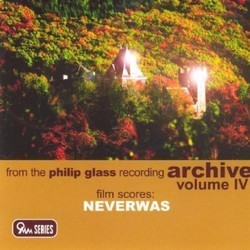Neverwas
¡Subscríbete!
¡Manténgase informado y obtener mejor acceso a la información de los coleccionistas!
¡Manténgase informado y obtener mejor acceso a la información de los coleccionistas!
| # | Pista | Duración | |
|---|---|---|---|
| 1. | Main Title Neverwas | 4:07 | |
| 2. | I Want the Job | 2:20 | |
| 3. | Hi Gabriel | 1:42 | |
| 4. | Meeting Maggie | 2:33 | |
| 5. | First Patient | 3:55 | |
| 6. | Records Room | 3:27 | |
| 7. | The Pierson Estate | 1:54 | |
| 8. | Remembering Thomas | 2:26 | |
| 9. | I am the King! | 2:14 | |
| 10. | Weirder and Weirder | 2:45 | |
| 11. | You're a Reporter! | 4:44 | |
| 12. | Dungeon Break | 4:29 | |
| 13. | The Riverknight | 2:31 | |
| 14. | Discovering Neverwas / Ghastly Arrives | 2:55 | |
| 15. | The Castle / My name is Zachary Small | 3:50 | |
| 16. | End Titles | 4:18 | |
| 17. | Neverwas Restored | 2:02 | |
| 52:12 |
Orange Mountain Music's 'from the Philip Glass recording archive' series brings the fourth volume, Glass's score to the film Neverwas. If the title of the picture doesn't ring a bell, that shouldn't be surprising, as the film itself almost 'Never was.' Made on a shoestring budget in 2005 by Joshua Michael Stern and starring an excellent cast that mostly worked just to be in the property, Neverwas is the story of a young man's search for his departed father, who was a children's book author who created a fantasy world that exists in its own right, at least among his fans. The tortured author, however, remains elusive, and the son's quest to find him among his various remaining associates and fans is the main meat of the story. Filmed in Bulgaria, the film proved too non-commercial to attract a distributor and ended up going straight to DVD.
Even annotator Richard Guerin admits that at first experiencing Neverwas, 'I couldn't help but be confused.' Glass' score to Neverwas is most characteristic -- conceived in some of his most familiar stylistic patterns -- and most uncharacteristic as it is written for a film in the fantasy-adventure milieu, a genre that Glass has approached only this one time. Generally sweet and light with some measure of ominous overtones, Neverwas is designed to fit the property it was created for and is lacking, overall, in the weighty seriousness that one associates rather naturally with Glass. However, it is delightful music on its own terms, and one senses that Glass was very happy working on this project. There are no hard turns or transitions in it that one finds in Glass when he's having to bite the bullet. It is mostly easy, natural music that flows on and on. Children will certainly enjoy its simplicity and sheer beauty, and adults looking to take a load off might also appreciate Neverwas as well. Pundits and goatee-scratching intellectuals will probably not find much to digest in the score to Neverwas, but as Oscar Wilde once opined, 'I adore simple pleasures; they are the last refuge of the complex.' In that sense, Glass' score to Neverwas is a complete success.
Even annotator Richard Guerin admits that at first experiencing Neverwas, 'I couldn't help but be confused.' Glass' score to Neverwas is most characteristic -- conceived in some of his most familiar stylistic patterns -- and most uncharacteristic as it is written for a film in the fantasy-adventure milieu, a genre that Glass has approached only this one time. Generally sweet and light with some measure of ominous overtones, Neverwas is designed to fit the property it was created for and is lacking, overall, in the weighty seriousness that one associates rather naturally with Glass. However, it is delightful music on its own terms, and one senses that Glass was very happy working on this project. There are no hard turns or transitions in it that one finds in Glass when he's having to bite the bullet. It is mostly easy, natural music that flows on and on. Children will certainly enjoy its simplicity and sheer beauty, and adults looking to take a load off might also appreciate Neverwas as well. Pundits and goatee-scratching intellectuals will probably not find much to digest in the score to Neverwas, but as Oscar Wilde once opined, 'I adore simple pleasures; they are the last refuge of the complex.' In that sense, Glass' score to Neverwas is a complete success.

